2025.8.26. North America West Coast Lecture Tour (4) Los Angeles
Hello. Today marks the fourth lecture of Venerable Pomnyun Sunim’s North America West Coast tour, held in Los Angeles, the largest city on the U.S. West Coast.
Sunim woke up at 4 a.m. and departed for San Francisco International Airport at 4:30 a.m. In the early morning, Mr. Park Il-hwan, who lives 15 minutes from the accommodation, had already arrived to provide driving service. Before leaving for the airport, Sunim expressed gratitude to Ms. Kim Jun-ja, who had provided the accommodation and prepared meals with great care.

Arriving at the airport at 5:30 a.m., the atmosphere was somewhat quieter than at Seattle Airport yesterday. After completing check-in and waiting briefly at the gate, Sunim boarded the 7 a.m. flight and departed from San Francisco.
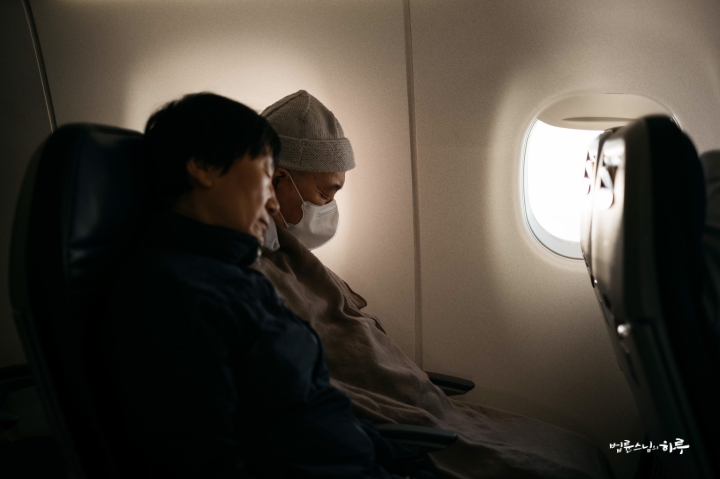
Two hours later at 9 a.m., upon arriving at John Wayne Airport in Orange County, Mr. Lee Kyung-taek was there to greet them. After exchanging warm greetings, they departed for Mr. Lee’s home. Upon arriving at the accommodation, Sunim had breakfast and rested briefly.
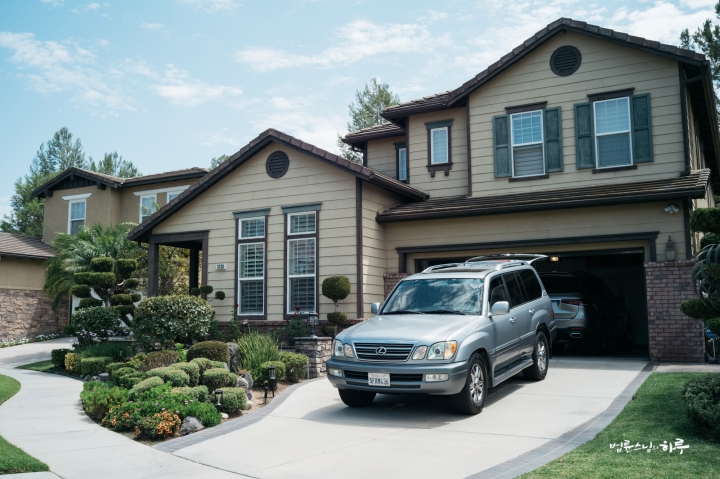
At 12:45 p.m., Sunim departed for Radio Korea, located in the heart of Los Angeles’ Koreatown. A live broadcast interview was scheduled for 2 p.m. Arriving at Radio Korea at 1:40 p.m., station staff were waiting in the parking lot.
“Sunim, thank you for visiting Radio Korea in person. Our staff and viewers have been eagerly anticipating this broadcast.”

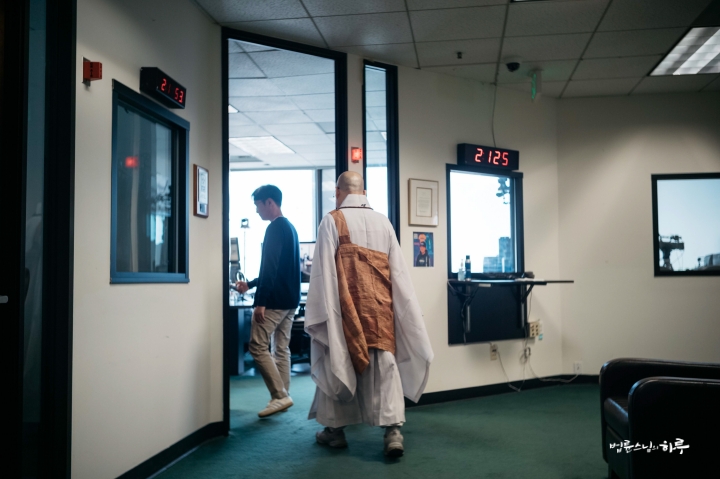
The interviewer, announcer Shin Aram, introduced herself as the current host of Good Day LA and mentioned her previous experience at Buddhist Broadcasting System. After a brief wait, they entered the studio for approximately 30 minutes of live interview and Dharma Q&A with listeners.
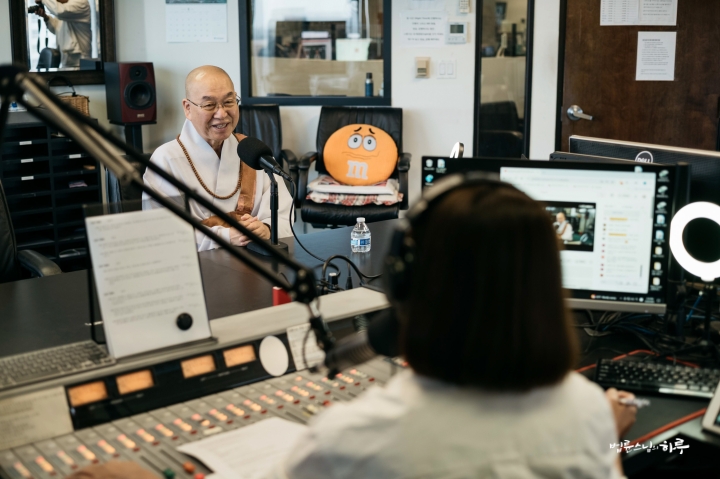
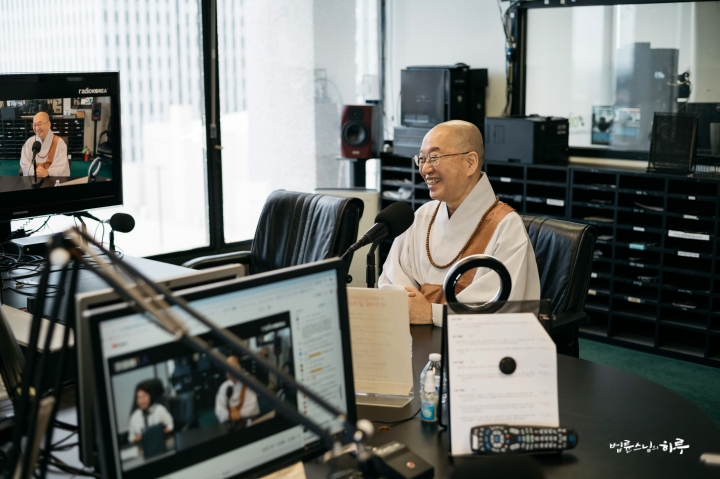
After the broadcast, Sunim presented Ms. Shin Aram with books brought from Korea as gifts.
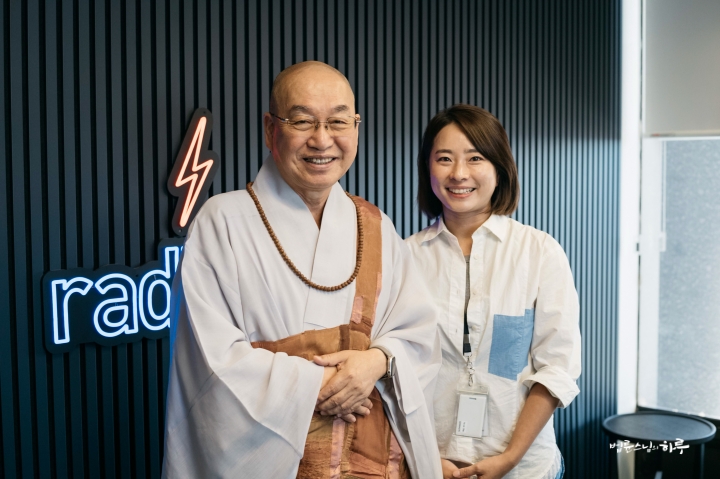
Leaving the station, Sunim visited the home of Ms. Park Myung-gwi, who lives nearby. Ms. Park served as the first general secretary from the early days of LA Jungto Society and, together with her late spouse Dharma Teacher Lee Kang-jun, laid the foundation for LA Jungto Society. She greeted Sunim with three prostrations. Sunim said, “Let’s see how things change each year from now on,” and took a photo together.
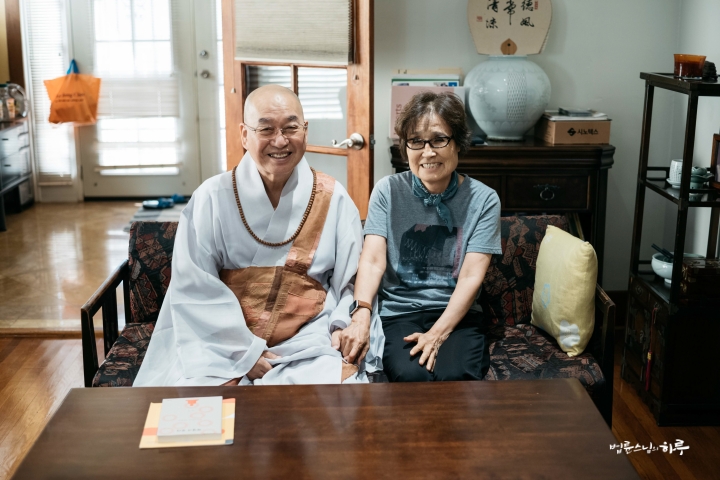
Over a warm cup of tea, conversation flowed as they reminisced about the past.
“I first came to LA in 1992. I only stopped by briefly then, and we officially started holding Dharma assemblies in 1993, so it’s been over 30 years already.”
Ms. Park also recalled her memories and added.
“I’ve been in America for 41 years now. The first time I met Venerable Pomnyun Sunim was when he visited Dharma Teacher Lee Kang-jun’s home.”
Sunim and Ms. Park reflected on the changes in LA’s Buddhist community, the generational transition in the Korean American community, and Jungto Society’s journey over the past 30 years. Names of old Dharma friends came up one by one, and there was a sense of loss as some had already passed away.
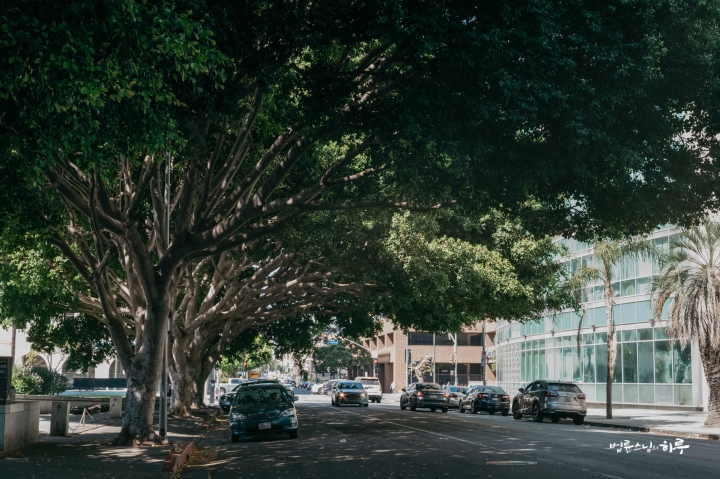
After finishing their conversation and having dinner, Sunim headed to the lecture venue at 6 p.m.

Today’s lecture was held at The One Banquet Hall on the 5th floor of Aroma, located in the heart of Los Angeles’ Koreatown. At the entrance, many volunteers were warmly welcoming attendees. People purchasing Sunim’s books, submitting questions, and many other Korean Americans headed into the lecture hall with the volunteers’ guidance.
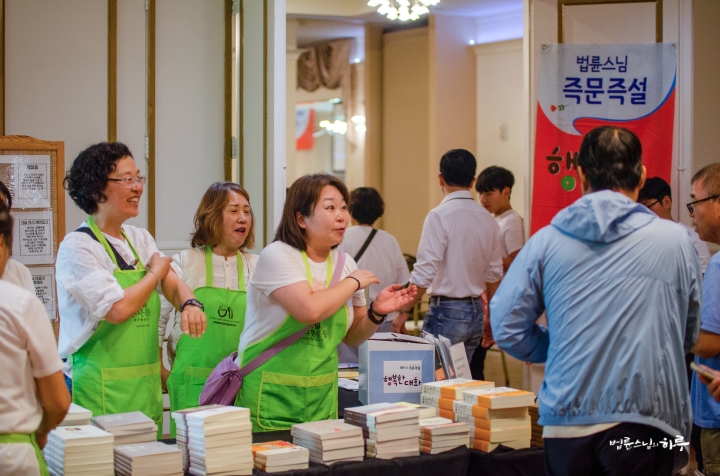
As 7 p.m. arrived and the sun set, an introductory video about Sunim was shown on stage. When Sunim took the stage, everyone welcomed him with enthusiastic applause.
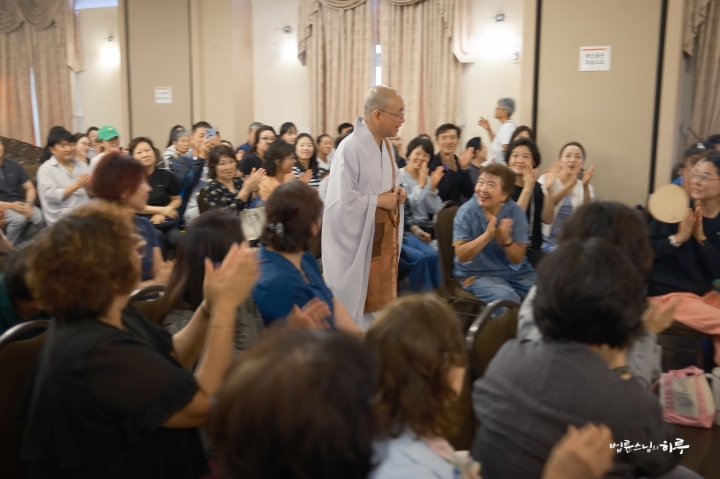
With about 200 people in attendance, Sunim began with a smile and greeting.
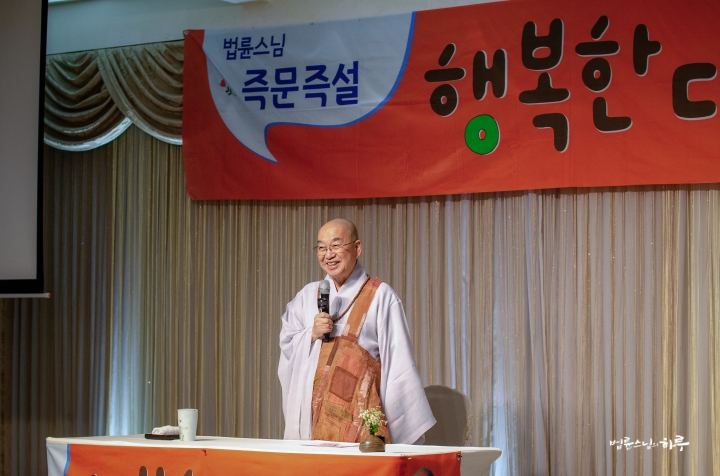
“How is life in America these days? Americans might not realize it, but the rest of the world is crying out about how difficult things are. Can it be right to make others suffer just so you can live well? In that sense, you all share some collective responsibility. (laughter)
Yesterday, our president visited the United States, and I was worried he might embarrass himself, but fortunately he avoided that. I’m not sure yet if it went well, but at least he didn’t suffer the humiliation that some other presidents have faced. I had previously met with government officials and advised that President Lee Jae-myung should tell President Trump, ‘Your role is crucial for world peace,’ and ‘If you help improve inter-Korean relations, we will actively support you.’ It seems the summit actually proceeded along those lines. I think they expressed this in English as ‘peace maker’ or ‘pace maker.’
Korea has a long history of showing respect to powerful nations, so we might not find such scenes particularly humiliating. However, there have been recent reactions of displeasure from Europe. This is because recently reported scenes showed President Trump sitting while the British and German leaders were standing, making it appear as if they were being reprimanded. Seeing the various interpretations and reactions in the international community, these are indeed interesting times.
Though the World May Shake, Practice Remains Steady
But regardless of how the world is, we who live in it must live each day without suffering. If we start blaming the world or others, we’ll never have a peaceful day. When it rains, use an umbrella; when it’s cold, put on more clothes; when it’s hot, take them off. This is practice.
If you have the power to change the world, then change it. But for things we absolutely cannot change, like climate change, we must adapt. Getting angry won’t change the world. So either live in harmony with the world, or gather strength to change it. Getting angry or moving somewhere else won’t solve anything.”
Following this, Sunim engaged in dialogue with those who had submitted questions in advance. From the middle of the session, he also took questions spontaneously from the audience. Over two hours, eight people asked Sunim questions. One person, feeling fear and anxiety about marriage due to divorce experiences in their family, sought Sunim’s advice on how to find a good partner.
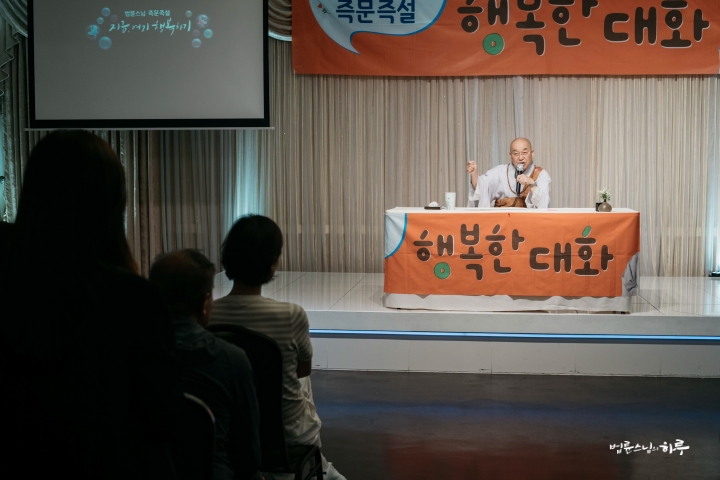
My Entire Family Is Divorced. Will I End Up the Same If I Get Married?
“A woman once asked me, ‘Sunim, I’ve been married three times. What sin did I commit in my past life to be so unhappy?’ So I replied, ‘I haven’t been married even once, but you’ve been married three times. What good karma did you accumulate in your past life to get married three times?’ Is getting married three times a sign of having good fortune with men or bad fortune? Then is my never getting married a sign of having no fortune with women? What do you think?”
“I think it depends on how you look at it.”
“Then why don’t you try changing your perspective too? Since your parents, grandmother, maternal grandmother, and aunt have all divorced, you won’t face any pressure if you divorce. You can date freely, marry if you find someone suitable, and divorce if it doesn’t work out—no one will criticize you. If no one in your family had divorced and you got divorced, the whole family would condemn you as if you’d committed a grave sin. But since everyone in your family has divorced, no one can say anything. You’re actually in a very comfortable position. There’s nothing to fear. So if you meet someone good, go ahead and get married. If you think you can divorce after three years if it doesn’t work out, you don’t need to worry like this.”
“But if I get married without these concerns, I feel like I’ll naturally end up divorcing.”
“In this day and age, is it really that great to live with one man for your entire life? Changing partners three times isn’t bad either. Why are you, a young person, so old-fashioned?” (laughter)
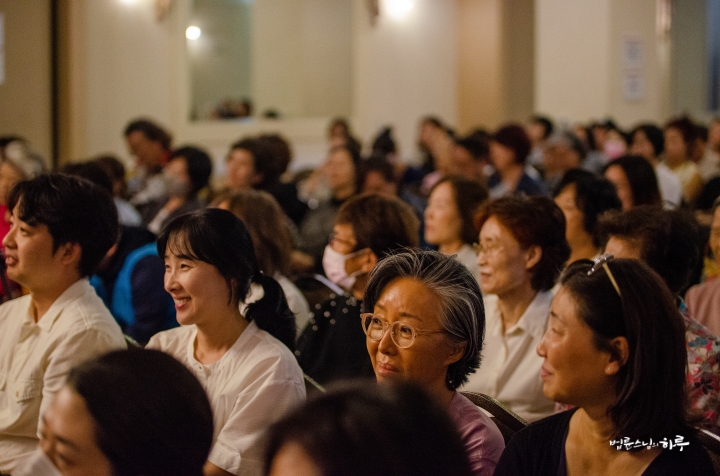
“Won’t the children be hurt?”
“In the past, divorce was rare, so it was traumatic, but not anymore. Even at school, children from divorced families are common. We already have a president who grew up in a divorced family. There’s no problem at all. It’s needless worry. Rather, you should think, ‘I’m really fortunate to have been born into such a family.’ You don’t need to feel any burden about divorce at all.
In the old days, marriage was once in a lifetime, and many people married without even seeing each other’s faces. Marriage was a big risk. That’s why people tried to reduce the risk by checking horoscopes. But things are different now. You can date before marriage, and you can even live together before deciding. If you don’t like it after marriage, you can divorce. With such freedom, why hesitate? Of course, I’m not saying to marry carelessly, but there’s no need to be that afraid.
If you want to live with a capable man, that’s fine. If there’s no such person, just live with someone you like for now. If financial capability becomes an issue while living together, you can find someone capable then. But if you marry a handsome and capable man, you might spend your life worrying about his relationships with other women. Living with someone better than you makes you the subordinate party. In the past, women had to depend on men economically, so they made such choices, but things are different now. Why do you insist on depending on a man? Wouldn’t it be fun to meet a younger man who earns less than you and grow together? Think about whether you’re stuck in old-fashioned thinking.
So there’s no need to worry about these issues. You don’t need to predetermine that ‘I must get married’ or ‘I must not get married.’ The same goes for divorce. As you live, you might live alone, meet someone good and get married, or divorce if it doesn’t work out. So it’s not a big deal. But will you really get married three times just because you want to? It’s not that easy. If you’re unlucky enough to meet a good man, you won’t be able to divorce, will you?” (laughter)
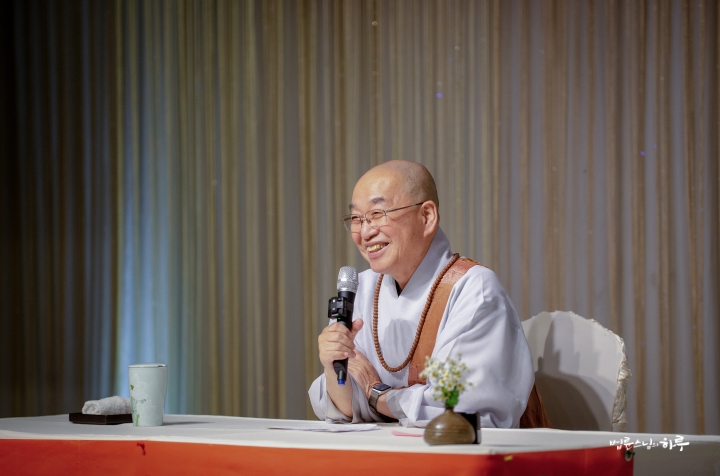
“But won’t getting married multiple times leave scars?”
“If you insist on living with only one man, it will leave scars. But if you think about living with several people, it won’t leave scars. Scars don’t inherently exist—they form when you set standards for yourself and fail to meet them. For example, if a monk decides to ‘live alone forever,’ not getting married doesn’t leave scars, but if an ordinary man can’t get married until seventy, he might feel scarred. However, scars don’t inherently exist.”
“But when you get married, you promise to be together forever, don’t you?”
“Monks also vow to remain monks for life when they become ordained. Yet many quit along the way. Marriage is the same. Everyone marries intending to live together forever; no one marries planning to live together briefly. But as you live, your feelings might change. That’s life.
If you decide ‘I must get married,’ you’ll suffer when you can’t get married. If you decide ‘I’ll never get married,’ you’ll suffer when you meet someone good. I haven’t decided ‘I’ll live alone forever’ either. I just think, ‘I haven’t met the right person yet.’ (laughter) Being too determined or resolved isn’t good. Just live your life. I’m not saying to be careless or reckless. I’m just saying there’s no need to suffer over these issues.
Meeting another man while your husband is alive is an affair, but meeting someone after your husband passes away isn’t a sin. You can live alone, or if you’re lonely, you can meet someone else. It’s like using a new hoe when the old one breaks. Be grateful to a husband who leaves on his own. He’s given you the opportunity to meet someone else. Just say ‘Thank you for everything’ and let him go. So what a wonderful family you have. It’s hard to find such a family.” (laughter)
“Thank you, Sunim.”
Questions continued one after another.
As a single mom running my own business, I accumulated credit card debt. When paying interest became difficult, I asked my wealthy older sister for help, but she refused, and I feel hurt.
My heart is delicate and sensitive, and I wish I could be more resilient. How can I avoid being hurt by my boyfriend’s blunt words?
My son left home taking only his wife. Living alone separated from family is difficult.
At the company where I’ve worked for over two years, I feel the supervisors lack leadership. They demand too much from me, and I want to leave, but I’m concerned about my green card status.
My father is self-made and strong-willed, and I’m strong-willed too. Should I continue living under my parents, feeling diminished, without achieving financial independence?
A new employee in his mid-50s joined our company and treats me authoritatively as if I’m beneath him. I get angry when I see his face and want to avoid him, but I can’t leave my job because of my green card.
The last questioner asked Sunim for advice on how to do Dharma Q&A for oneself like Sunim does.
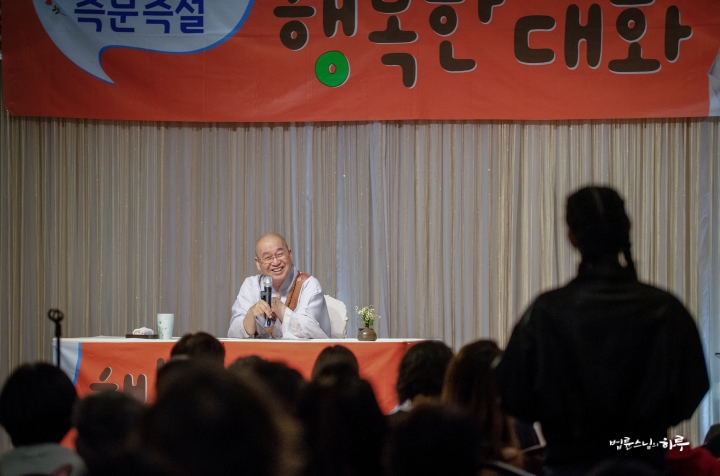
Can I Do Dharma Q&A for Myself Like You Do, Sunim?
“There’s a Korean saying, ‘A monk can’t shave his own head.’ I can give advice about other people’s problems like this, but I’m not so good with my own issues.”
“If I deeply realize the Buddhist path, could I give myself good answers like you do?”
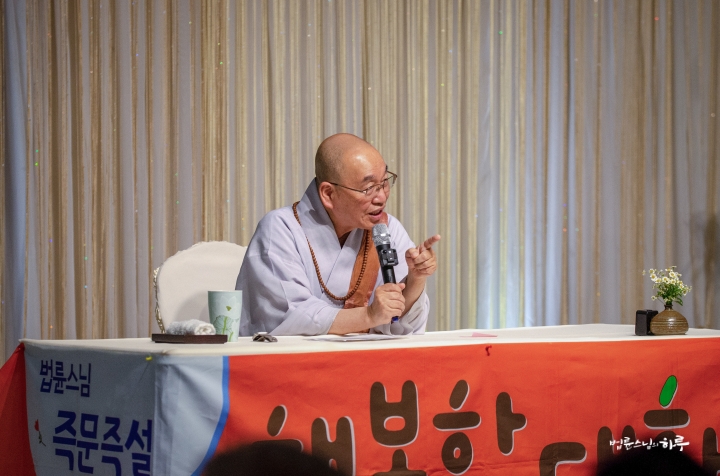
“If you approach it that way, it becomes difficult. You need to experience a bit more hardship than others. Live without parents as a child, experience abuse, get beaten, be imprisoned or tortured, be ostracized—experience various sufferings that people in the world go through firsthand. Or if you live a life close to such suffering, you’ll naturally understand the human heart without necessarily doing meditation. As we say in Korean, ‘understanding opens up.’
Someone who has repaired cars for a long time can tell what’s wrong just by hearing the engine. A doctor who has treated many patients can guess what’s wrong just by looking at their face. Similarly, someone who has experienced much suffering naturally knows how to escape from that suffering. In Christian terms, God’s voice is finally heard in deep suffering. You don’t escape suffering simply by believing in Christianity. So you too need to experience much suffering. But most people want to avoid suffering.”
“Yes, I want to avoid suffering too. I’ll just live as I have been.”
“There’s an old saying, ‘Buy hardship when you’re young.’ While you don’t need to create suffering deliberately, there’s no reason to avoid the suffering that comes your way. That suffering is precisely the opportunity to deeply reflect on the life given to you.
If difficulties remain as wounds, they become a great debt in life. But if you turn them into experience, they become great assets instead. For example, when counseling women who have experienced sexual harassment, someone with the same experience can better understand that pain. But if that experience still remains as a wound, the counselor will be swept up in anger and unable to counsel properly. Someone who has overcome their wounds can, first, deeply understand others’ pain, and second, convey hope saying, ‘I overcame it, so you can too.’ Those who have overcome difficulties gain greater strength to work for the world. Former Gyeonggi Province Governor Nam Kyung-pil reportedly said this while visiting his son imprisoned for drugs:
‘Do you know what’s hardest in politics? Raising name recognition. But in Korea, almost everyone knows that Governor Nam Kyung-pil’s son is a drug addict. In terms of recognition, you’re almost number one. If you completely quit drugs and do meaningful work for society, you can become a more powerful messenger than anyone.’
He encouraged his son who was about to be released with these words. Like this, our experiences help someone. Someone who has lived as an immigrant for 20 years has an advantage when counseling immigrants, and someone who has experienced business failure better understands the hearts of those who have failed. Someone who has experienced divorce can more deeply understand divorced people.
This doesn’t mean you have to experience everything directly. The reason I can have various conversations with you is partly because I have little attachment, but also because, though I haven’t mentioned it, I too have gone through many life processes that you have experienced or might experience. Practice is about healing those wounds and sublimating them into experience. So first, when no residue of wounds remains, you can more easily empathize with others’ stories. Second, when you overcome any situation and look back, you realize ‘it wasn’t a big deal.’ That’s why you can give others hope that ‘it’s not a big deal.’
As the saying goes, ‘Buy hardship,’ if hardship comes your way, you need an attitude of willingly accepting it. If you have a perspective of wanting hardship, everything that happens to you becomes good. If you know disasters are blessings, there’s nothing in the world that isn’t a blessing.
Even those struggling with green card issues, if they overcome the process well, will gain valuable experience that allows them to counsel others struggling with green card issues in the future. Everything in our lives is, in Christian terms, God’s grace. Even Jesus being crucified was ultimately God’s will. In Buddhist terms, everything we experience is the karmic result of causes we’ve created. So I hope you’ll have an attitude of willingly accepting whatever comes. With this perspective, life will become much lighter.”
“Thank you. I understand well.”
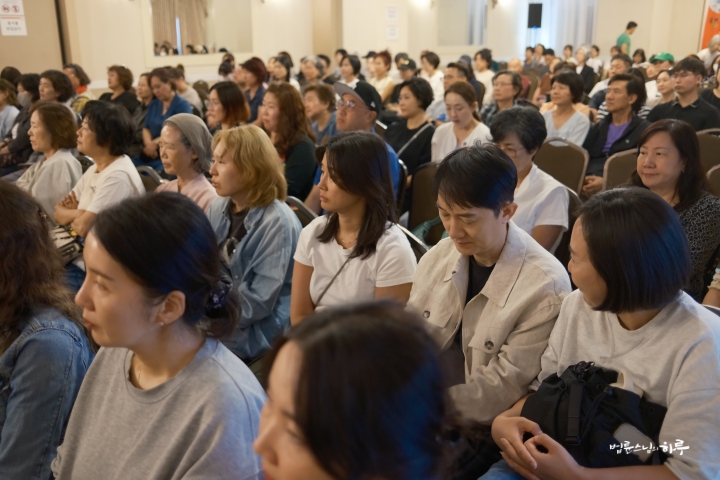
After finishing the conversation, it was past 9 PM. The audience expressed their gratitude to Sunim for coming from afar and giving precious teachings with enthusiastic cheers and applause.
A book signing followed. Most of the Korean residents who attended stood in a long line to get Sunim’s autograph and express their gratitude.
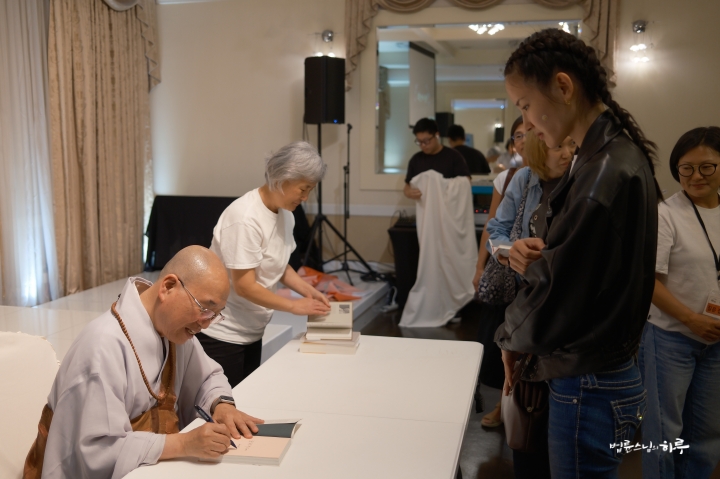
After all the audience members left the venue, Sunim took a commemorative photo with the volunteers who prepared the lecture.
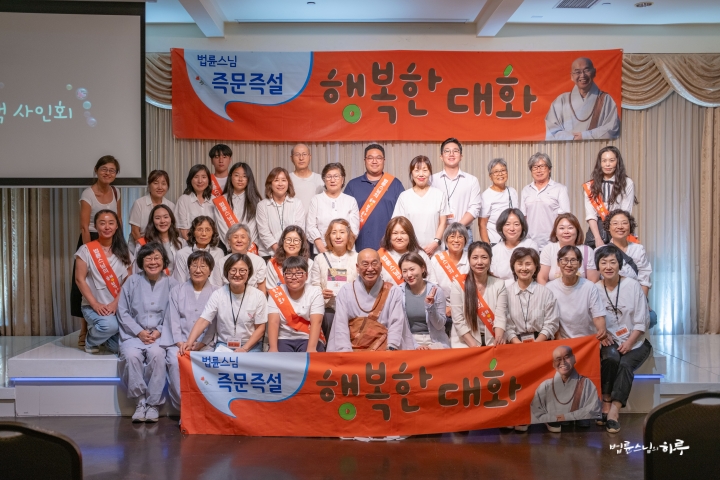
Sunim then presented a book to Kang Boran, who coordinated today’s lecture.
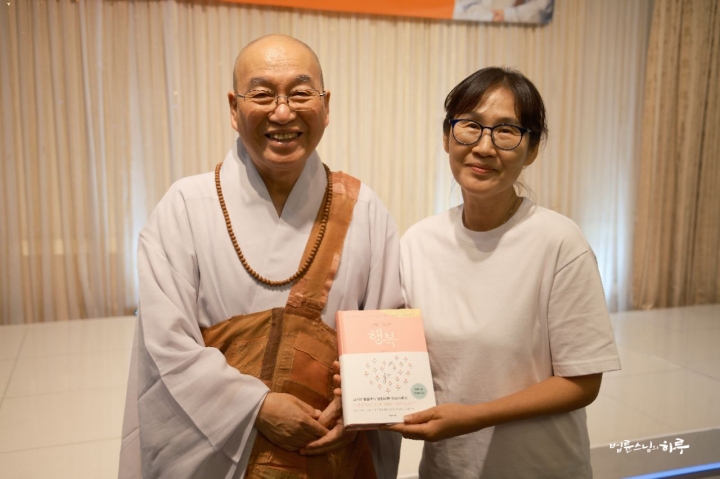
After expressing gratitude to the volunteers, Sunim headed to his accommodation. The volunteers had a mindful sharing session with Dharma Teacher Myodeok and Dharma Teacher Beophae.
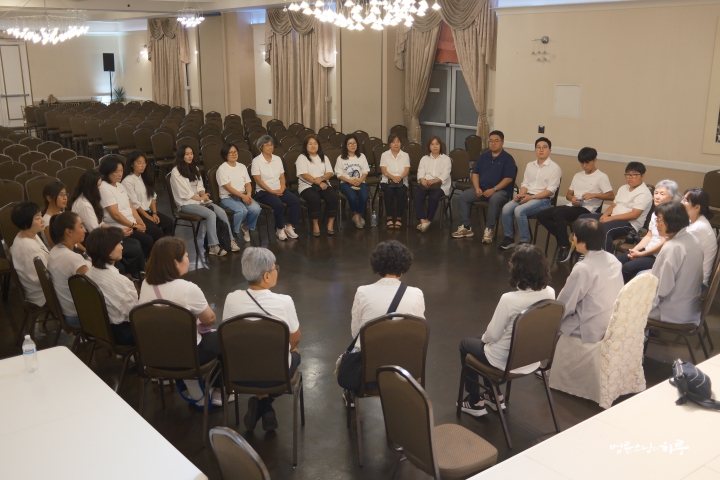
“I hadn’t been attending Weekly Dharma Assembly regularly, but volunteering today, I felt the strong bond with fellow members again. I thought, ‘Ah, this is what Jungto Society was about.’ I’m grateful to be able to maintain this connection, even if thinly.”
“I volunteered more than last year. Naturally, I developed a sense of ownership and felt much closer in heart.”
“I had no connection with Jungto Society, but I volunteered for the first time. It was nice meeting new people, and I feel proud.”
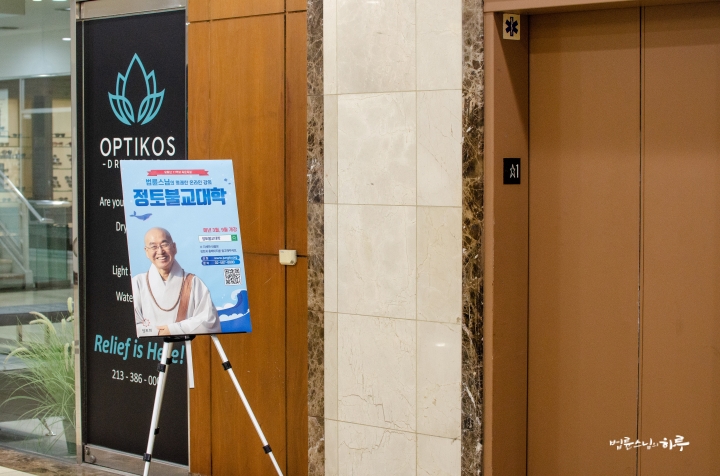
It was past 10 PM when Sunim arrived at his accommodation. After proofreading manuscripts, Sunim concluded his day.
Tomorrow, Sunim will depart from Los Angeles and drive 440km to Las Vegas to continue the fifth lecture of the North American West Coast tour.





